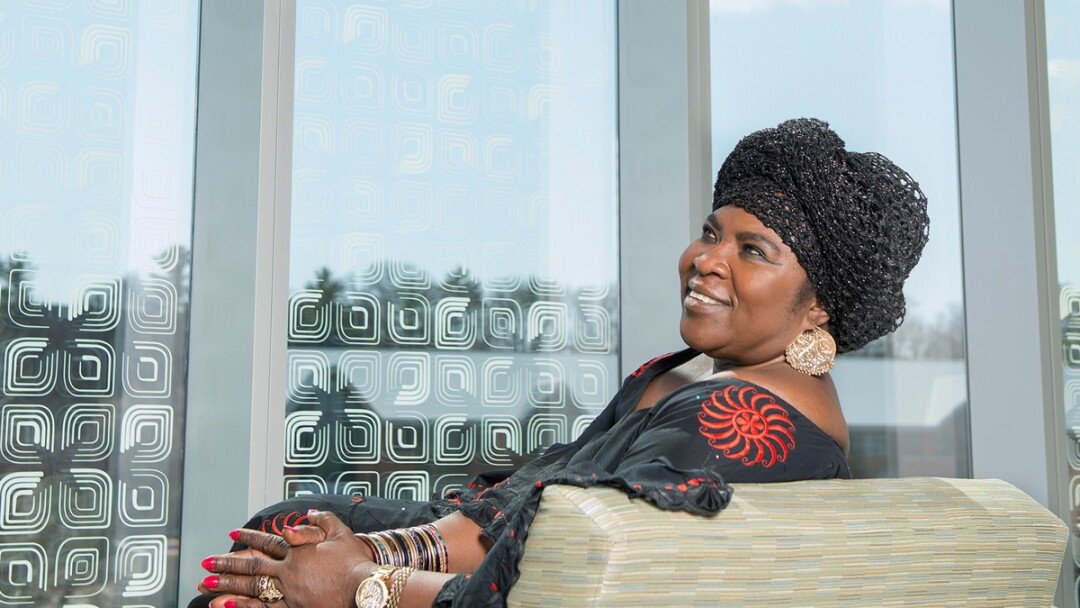Getting the Nobel Nod
UWEC’s Onwueme was nominated for literary prize
Judy Berthiaume, UW-Eau Claire |

What do music legend Bob Dylan and UW-Eau Claire’s internationally celebrated playwright Dr. Tess Onwueme have in common?
A lot, as it turns out.
Both are so accomplished, respected, and influential in their fields that they were among the recent nominees for the Nobel Prize for Literature.
Dylan won the award in October, but Onwueme says she’s still in a state of elation – and shock – knowing that she was among those nominated for the honor, which often is described as the most prestigious literature award in the world.
“I stared at the message in disbelief; I was trembling. His message landed like a thunderbolt, the kind of thunderbolt that ignites life and sparks joy.” – Tess Onwueme, describing her reaction to learning she had been nominated for a Nobel Prize in Literature
“It is a miracle to be in this pool,” says Onwueme, UWEC’s university professor of global letters and professor of English. “It was most unexpected. The first couple of weeks after I found out I was in a state of disbelief. I was giddy with joy. Many of my idols haven’t won it so it was unbelievable that I was being considered.”
Onwueme was nominated by an international team of highly acclaimed writers and scholars with supporting documentation from European, Asian, African, and American scholars.
She learned of the honor last summer when she received an email from a well-known Indian writer stating that he, with the support of many others, had nominated her for a Nobel Prize.
“I stared at the message in disbelief; I was trembling,” Onwueme says of learning about the nomination. “His message landed like a thunderbolt, the kind of thunderbolt that ignites life and sparks joy.”
One of the most celebrated and prolific women playwrights from Africa, Onwueme is the only four-time winner of the Association of Nigerian Authors drama award. In addition to having published more than 20 plays, she has received numerous grants and international literary honors and awards, and her work has been the subject of dozens of scholarly works.
But it was the prestigious 2009 Fonlon-Nichols award, given only to the most significant black writers, that Onwueme believes may have led to the Nobel nomination. “This award for literature moved me into that category of writers who could be considered,” she says. “Some notable writers who have won this award have advanced to become Nobel Prize nominees.”
While she’s used to her work being honored and she’s proud of the many accolades that have come her way throughout her distinguished career, nothing compares to knowing that she now is part of what can best be described as a very elite club.
She also knows with the honor also comes a great deal of responsibility. “I’m overjoyed and electrified, but with this comes the responsibility that goes along with receiving such gigantic recognition,” Onwueme says. “This is like being 1,000 feet tall – you can’t hide. My words now must be chosen carefully because they will be heard and once spoken cannot be taken back.”
Since 1901, the Nobel Prize in Literature has been awarded annually to an author from any country who has, in the words of the will of Alfred Nobel, produced “in the field of literature the most outstanding work in an ideal direction.”
The Swedish Academy decides who, if anyone, will receive the prize in any given year. Nominations for the Nobel Prize in Literature can be made only by people the Swedish Academy has deemed qualified and who have been invited to submit nominations. The names of the nominees and other information about the nominations will not be revealed by the Swedish Academy for 50 years, which means that often people who’ve been nominated never know it.
Onwueme found out only because the lead nominator chose to tell her, since they had been teaching and staging a number of her plays in India.
In the nomination materials shared with her, the scholar describes Onwueme as the “tallest female literary figure in both African and American Black Drama with her over 20 published plays that have gained increasing demand and notoriety in academic and public stages and classrooms around the world.”
The nominator goes on to note that a number of Onwueme’s award-winning plays, such as Shakara: Dance-Hall Queen, have been translated into Hindi and performed in both Hindi and English in New Delhi. The nomination also notes that a growing number of teachers, protégés, scholars, and performers are studying, teaching, writing, and performing her dramas.
“Tess Onwueme is an unmistakable contagious voice of inspiration, who writes with such exceptional passion and commitment in her tenacious advocacy for the marginalized youth, women, and the poor, as well as the environment in the global society today,” the nomination states.
That the lead nominator is a well-known writer from India, not Nigeria or America, is especially meaningful to her because it means her work is being recognized and celebrated in the global community, Onwueme says. She first visited India in 2007, when she was part of a U.S. State Department Public Diplomacy Specialist/Speaker initiative in the region.
Her writing, which focuses on the politics of social injustice, inequality, class, and caste systems, resonated in India, where people are experiencing many of the challenges of feeling powerless and voiceless.
“Poverty has no statute of limitations today,” Onwueme says. “People everywhere can relate to themes around the powerful vs. the powerless, along with today’s growing environmental ‘poly-tricks’ choking the university. Wherever we are in the world, we are grappling with similar challenges and concerns.”
It was during that visit to India that she first met a well-known writer who was surprisingly and extraordinarily familiar with her work. At that time, he made a comment about looking forward to her someday winning the Nobel Prize in Literature. “I took the compliment gracefully, but gave it no more thought,” Onwueme says. “It was like being told you were going to land on the moon.”
Little did she know that nearly nine years later, that same respected writer would be her lead champion when forwarding her name and credentials as part of a Nobel nomination.
“It’s been quite a journey,” Onwueme says of her career, which first brought her to the United States in 1988 when her award-winning play, The Desert Encroaches, was featured on stage at the First International Women Playwrights Conference in New York.
That same year, her play, The Broken Calabash, directed by notable playwright/director Dr. Von Washington, also was showcased on stage at the Bonstelle Theatre in Detroit.
The journey that illuminated Onwueme’s drama to American audiences led her a few years later to UWEC, when she joined the university’s English department in 1994, and now to the elite group of writers who have been nominated for the Nobel Prize in Literature.
“My joy in being nominated will chime forever,” she says.
Learn more about Tess Onwueme’s life and work at writertess.com.






















